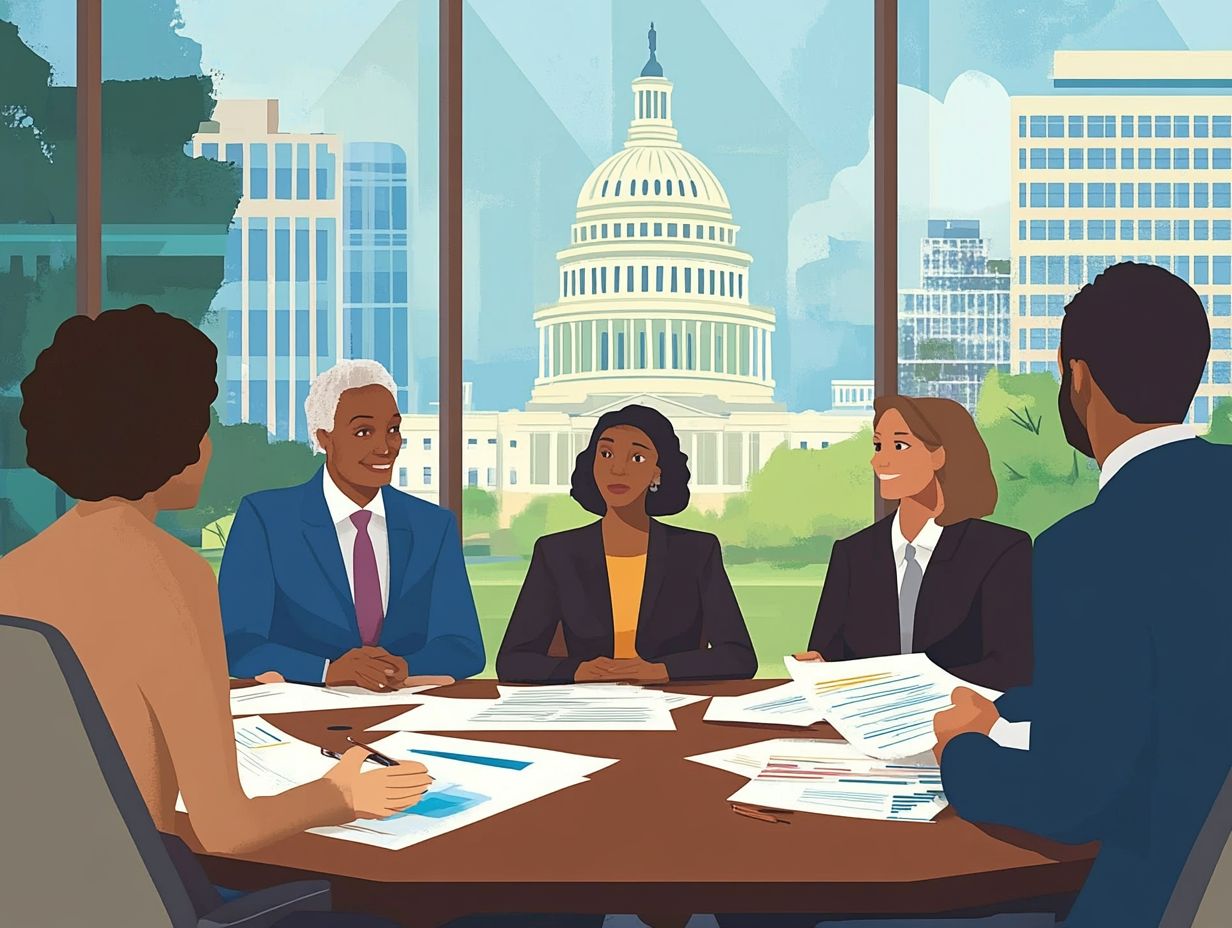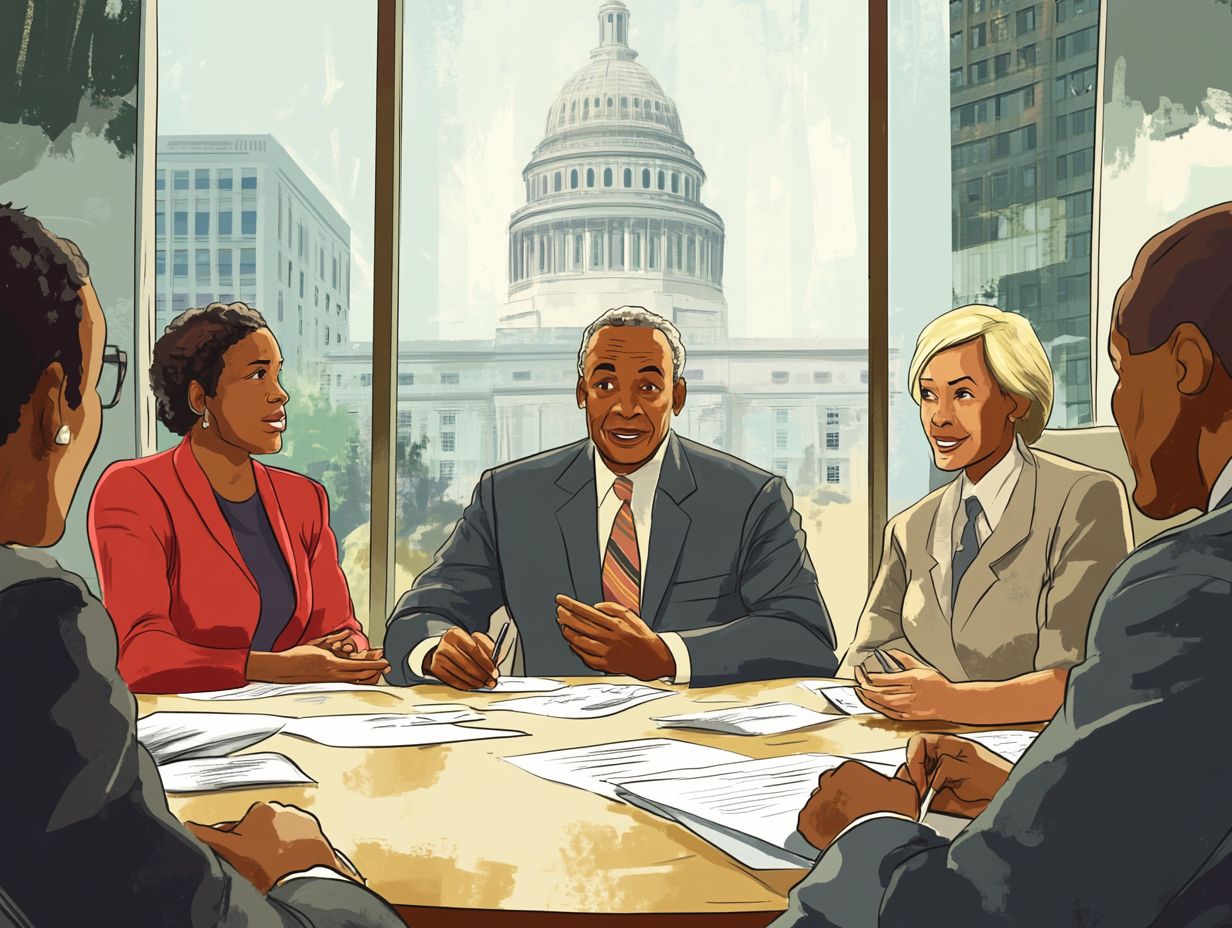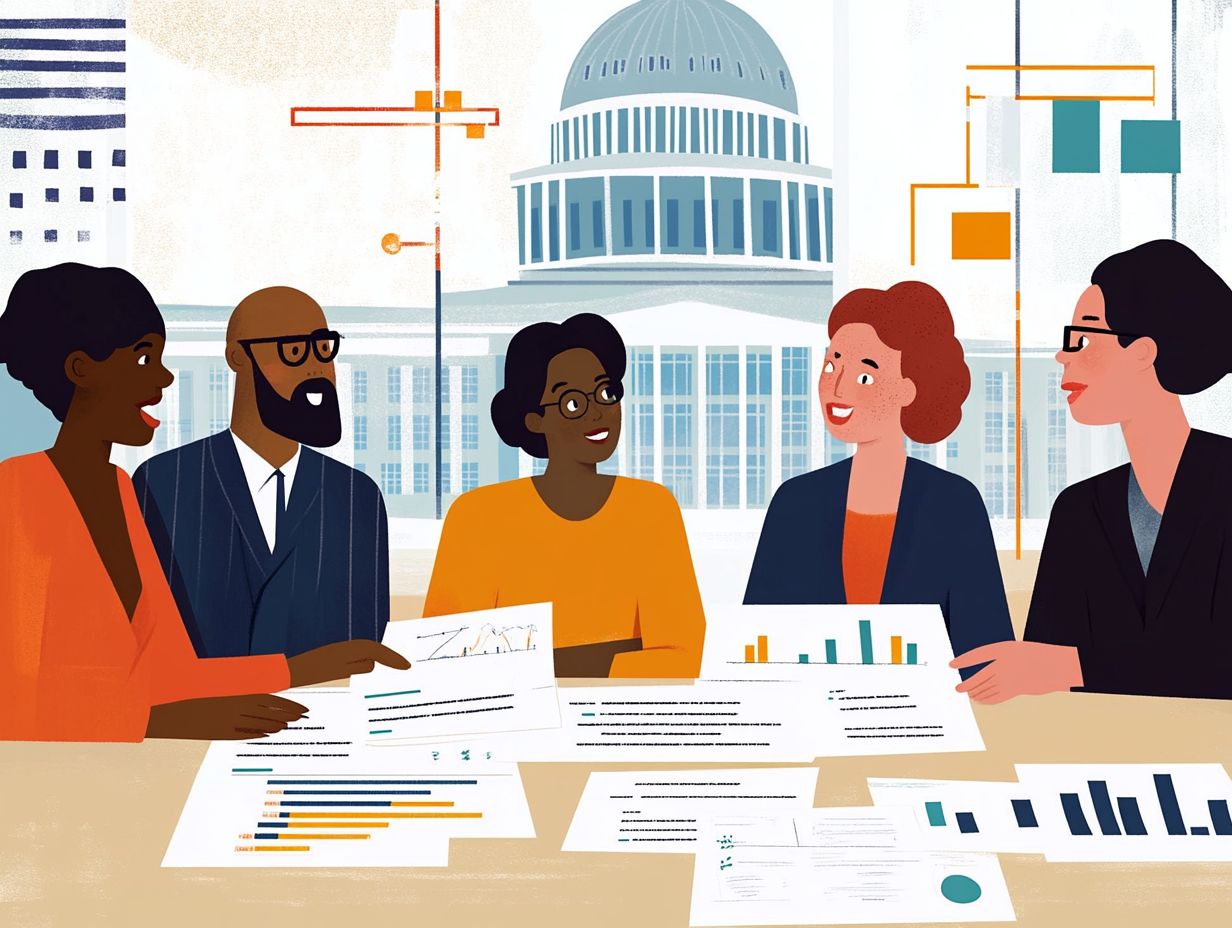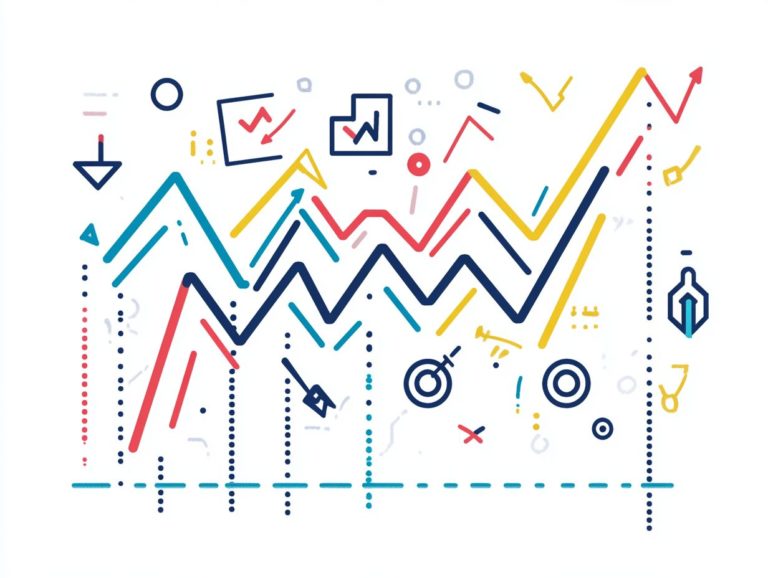Analyzing the Role of Government Policies
Government policies shape how societies operate. They influence areas like economic growth, social welfare, and environmental sustainability.
Understanding these policies is crucial for your daily life and your community’s well-being. This article explores what government policies are, their significance, and the factors that shape them.
You ll also learn how to evaluate their effectiveness and the challenges in implementing changes. Join in as we uncover the mechanisms that drive policy decisions and their effects on society.
Contents
Key Takeaways:

- Government policies are rules and regulations set by the government to guide various aspects of society and the economy.
- These policies significantly impact society and the economy. Their effectiveness depends on factors like the political climate, economic conditions, and public opinion.
- To evaluate the success or failure of government policies, measures must be in place to assess their effectiveness. Implementing and changing policies can be challenging, so strategies must be carefully considered.
Understanding Government Policies
Understanding government policies is essential for crafting effective public strategies that benefit various stakeholders, including civil servants, nonprofit organizations, and citizens.
These policies shape social welfare initiatives and influence the legislative process. They ensure that community partners stay informed and actively engaged in policy development.
By employing methods of analysis both qualitative and quantitative you can evaluate the implications of proposed policies, identifying challenges and opportunities for enhancement.
Rigorous policy analysis helps define problems more clearly and strengthens decision-making in public administration.
Defining Government Policies
Government policies serve as formal statements that guide public officials in achieving specific objectives within society.
These policies cover a broad spectrum, from economic regulations to social welfare programs. They are crafted through thorough policy analysis that considers public needs, economic implications, and ethical considerations.
Public officials gather input from stakeholders, conduct impact assessments, and refine proposals to address community concerns.
For instance, environmental policies may result from research on climate change, while education policies often aim for equitable access to resources. Familiarizing yourself with different types of policies helps you engage meaningfully in discussions about legislative priorities and advocate effectively for your interests.
The Importance of Government Policies
The significance of government policies lies in their ability to shape both societal and economic landscapes. These policies guide the development of social welfare programs and address critical implications for a diverse range of stakeholders.
By understanding these dynamics, you can appreciate how effective governance influences the well-being of communities and the economy at large.
Now is the time to get involved in local policy discussions or research specific policies that impact you. Your voice matters!
Impact on Society and Economy
Government policies have a considerable influence over both society and the economy. They shape everything from public health initiatives to strategies for economic growth.
For example, policies designed to enhance access to healthcare profoundly affect population health. This results in a more productive workforce and ultimately reduces healthcare costs over time. Austerity measures, or cuts to government spending, can limit funding for essential social services, deepening issues like poverty and unemployment.
In this complex landscape, nonprofit organizations emerge as vital players. They step in to fill gaps left by inadequate government support. By delivering essential services and advocating for meaningful policy changes, nonprofits work to alleviate the adverse effects of government decisions on vulnerable communities. This underscores the intricate connections between policy, society, and economic well-being.
Types of Government Policies
Government policies can be categorized into several distinct types: economic, social, and environmental.
Each category uniquely addresses challenges and objectives that arise within society, reflecting the complexities of governance and the diverse needs of its citizens.
Economic Policies

Economic policies are crafted to steer the economy. They influence critical factors like inflation, employment, and trade, with significant repercussions for various stakeholders.
These policies nurture stable growth, lower unemployment rates, and ensure price stability. This ultimately creates an environment that benefits both businesses and consumers. For instance, a government might adopt expansionary monetary policies to boost spending during a recession, as illustrated by the actions taken in the wake of the 2008 financial crisis.
Austerity measures that prioritize reducing public deficits through spending cuts can lead to social unrest and hinder economic growth. This has been evidenced by certain European nations. By examining both successful and unsuccessful initiatives, you can gain deeper insights into the complexities of economic management and its far-reaching effects on the overall economic system.
Social Policies
Social policies aim to improve your well-being through initiatives in social welfare, public health, and community development.
These policies tackle systemic issues like poverty, inequality, and access to healthcare. These challenges are essential for cultivating a healthier society. Effective public health strategies might include vaccination programs or mental health services, all aimed at enhancing community wellness.
Collaboration with local organizations and community partners is crucial for successful implementation. This ensures initiatives are customized to meet each area’s specific needs. By actively involving citizens in the planning process, social policies gain effectiveness and empower communities to take ownership of the solutions that impact their lives.
Environmental Policies
Environmental policies are vital for tackling issues surrounding climate change, resource management, and sustainability. These often require collaboration among diverse stakeholders.
These policies aim to mitigate the detrimental effects of environmental degradation while promoting practices that conserve resources for future generations. Legislation like the Clean Air Act highlights the importance of reducing air pollution and safeguarding public health.
Implementing these policies can be complex. They are often hindered by competing economic interests and varying levels of commitment from different stakeholders. Engaging communities, businesses, and non-profit organizations is crucial in this process. Ensuring that everyone has a voice in decision-making fosters inclusivity and leads to more effective and sustainable outcomes.
Factors Influencing Government Policies
Government policies are shaped by a complex interplay of factors, including the prevailing political climate, economic conditions, and the sentiments of the public.
Each of these elements plays an important role in determining the direction and effectiveness of policy decisions. They ensure that policies resonate with the needs and aspirations of the populace.
Political Climate
The political climate plays an important role in shaping government policies. Your priorities and ideologies significantly influence the legislative process.
Consider how recent shifts in the political landscape, particularly the change in administration after the 2020 elections, have led to renewed focus on climate change and social equity. The new administration’s commitment to rejoining international agreements like the Paris Accord marked a notable departure from previous policies that favored deregulation.
This transformation has reshaped environmental policies and influenced funding for green technologies.
As political parties contend with pressing issues like healthcare reform and immigration, the outcomes often reflect the prevailing ideology of those in power. This shows how politics and policy are connected, reaffirming the impact of the political landscape on the broader societal framework.
Economic Conditions
Economic conditions, whether a recession or a period of growth, directly influence how government policies are formulated and their effectiveness. This results in a spectrum of policy options for stakeholders.
When the economy contracts, policymakers often grapple with urgent issues, leading them to prioritize stimulus packages or enhanced social welfare initiatives.
During periods of economic growth, the focus typically shifts toward long-term investments in infrastructure or education. This trend is evident in various countries throughout different historical contexts.
By diving into case studies from these contrasting economic climates, you can gain a clearer perspective on how economic fluctuations act as catalysts for policy shifts. They effectively shape the governmental agenda and address the immediate needs of the populace.
Public Opinion

Public opinion plays a vital role in shaping government policies. Policymakers must engage with stakeholders to ensure their actions reflect the desires of the citizens.
Understanding public sentiment is essential for you as a decision-maker. It can guide your decision-making processes and shape legislative priorities.
Policymakers often rely on a mix of qualitative and quantitative research methods to gauge the perspectives of various demographic groups.
Qualitative methods involve personal opinions and experiences, while quantitative methods rely on numerical data and statistics. Surveys, polls, and focus groups shed light on the preferences and values of the electorate.
Deeper qualitative analysis adds context and nuance to these insights. By embracing diverse viewpoints, you can develop policies that are not only effective but also resonate deeply with the hopes and concerns of the populace. This ultimately cultivates trust and accountability in governance.
Evaluating the Effectiveness of Government Policies
Evaluating the effectiveness of government policies is crucial for assessing whether they achieve their intended objectives and deliver genuine value to society. Systematic program evaluation and empirical research provide the insights necessary for this assessment, enabling you to understand the real impact of these policies.
Measuring Success and Failure
Measuring success and failure in government policies requires engaging in rigorous evaluation techniques, such as cost-benefit analysis the process of comparing the costs and benefits of different policies and the thoughtful consideration of policy alternatives.
These techniques empower you to assess not just the financial implications, but also the social impacts of your decisions. Comprehensive evaluations draw upon various metrics, including public opinion surveys, statistical analyses, and performance indicators, to effectively gauge how well policies are working.
Use these tools to discover which policies are successfully achieving their intended goals and which ones might need reevaluation or even termination. Understanding the outcomes of past policies informs your future strategies, enabling adaptive governance a method of adjusting policies based on outcomes that enhances public welfare and promotes accountability in the decision-making process.
Implementing and Changing Government Policies
Implementing and adjusting government policies requires navigating a landscape filled with various challenges. It demands strategic approaches essential for achieving successful outcomes in policy implementation.
Each decision you make is pivotal in shaping the effectiveness of these changes.
Challenges and Strategies
Challenges in implementing government policies often arise from resistance among stakeholders. Therefore, you need well-defined strategies for effective stakeholder engagement.
These obstacles can take many forms, including differing priorities, insufficient resources, and cultural barriers that impede cooperation. For instance, a case study on healthcare reform revealed that local community leaders frequently felt excluded from the decision-making process. To address this, engage stakeholders through structured dialogues and feedback workshops.
By actively involving these individuals and addressing their concerns, you can cultivate a collaborative atmosphere that aligns shared goals. Leverage digital platforms for ongoing communication, which has proven invaluable for maintaining engagement and trust, ensuring that every voice is heard and considered throughout the implementation phase.
Frequently Asked Questions
- What is the role of government policies in society?
- The role of government policies in society is to set guidelines and regulations to promote the well-being and development of its citizens. These policies address issues such as economic growth, social welfare, and environmental sustainability.
- How do government policies impact individuals and businesses?
- Government policies can significantly impact individuals and businesses, as they can affect factors such as taxes, regulations, and access to resources. These policies create opportunities and challenges for different groups in society.
- What are some common types of government policies?
- Common types of government policies include fiscal policies, which involve taxes and spending, and monetary policies, which control the money supply in the economy. Other types include trade policies, environmental policies, and social policies.
- How does the government analyze the effectiveness of its policies?
- The government uses various methods to analyze and evaluate the effectiveness of its policies, such as conducting research, gathering data and statistics, and consulting with experts and stakeholders. This helps determine if policies are achieving their intended goals and if any adjustments need to be made.
- What is the role of public opinion in shaping government policies?
- Public opinion plays a significant role in shaping government policies as it reflects the views and preferences of the population. Governments often consider public opinion when making policy decisions, aiming to represent and serve the interests of their citizens.

Stay informed and participate in shaping the policies that affect you!
How can citizens participate in analyzing and influencing government policies?
Citizens can participate in government policies in many ways. They can attend community meetings, vote in elections, join advocacy groups, and share their views with policymakers.
By engaging in these activities, citizens help shape policies that reflect their needs and values. Your voice matters get involved and make a difference!






